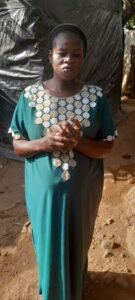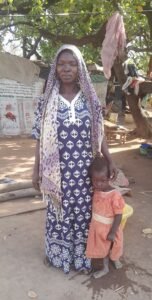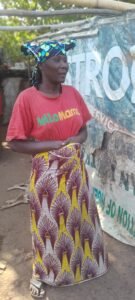In the heart of the New Kurchigoro IDP camp, nestled along the Airport Road in Abuja, lies a community of displaced individuals who fled their homes due to insurgency. One of these individuals is Victoria Lukas, a 35-year-old mother of six, who has faced unimaginable challenges in her journey from Gosa, a community in Borno State, in search for safety and a new beginning.
Victoria’s story is one of resilience, hardship, and the relentless pursuit of a better life for her children, despite the harsh realities she faces every day., African Health Report (AHR)’s Gom Mirian visited the camp and stumbled upon Victoria in her makeshift shelter. Clad in a worn-out fabric that barely protected her from the elements, she sat on the floor with her hands clasped on her head, seemingly hopeless.
The scorching sun beat down relentlessly, accompanied by the acrid smell of burning refuse and the thick dust that permeated the air. Victoria emerged from her shelter, her eyes reflecting the weariness accumulated from her struggles. Eight months pregnant, her worn clothes barely concealed the roundness of her belly. Though far gone in her pregnancy, she revealed that the absence of healthcare facilities in the camp and her inability to afford medical expenses had prevented her from enrolling in antenatal care.
Victoria shared softly, “My pregnancy is eight months along, and I haven’t been able to go to antenatal clinics since I became pregnant with my seventh child. We don’t have a hospital here in the camp, and I don’t have the means to transport myself to other healthcare facilities, let alone pay for their services. But by God’s grace, I hope to start my antenatal clinic next week.”

Failed Promises
Victoria’s story resonates with the challenges faced by many mothers in the camp. The harsh weather takes a toll on their health as they and their children sleep under flimsy blankets, leaving them vulnerable to the elements. Victoria has endured a persistent cough for four months, coupled with the humiliation and discomfort of involuntary urine flow when she coughs. She confides,” The cold here is quite severe and there are too many mosquitoes coupled with the fact we sleep on the bare floor. My children get sick frequently.
“I have been experiencing a cough for the past four months, whenever I cough, urine flows involuntarily,” she said, her face contorted with pain as she described the humiliation and discomfort she endures daily.
“If not for Boko Haram, we wouldn’t be here. We used to have our means of livelihood in Gosa. But here, we face numerous challenges. We have no money for our daily needs, no funds for healthcare or education,” Victoria said with regret. “My fifteen-year-old son cannot proceed to secondary school because we can’t afford the fees.”
Victoria’s story is just one among many in the camp, where mothers grapple with challenges in providing for their families and ensuring their children’s well-being.
Abandoned to Their Fate
In an interview with AHR, Hanatu Ibrahim and Ladiya Mathias, two other mothers in the camp, shared their struggles and the economic implications of their displacement. Hanatu, a young mother of three children, recounted the difficulties of securing livelihood opportunities in the camp. “We used to have a small farm back in our village, but here, we have no land to cultivate. Finding work is a constant struggle, and providing for my children has become increasingly challenging,” she lamented.

She emphasised the need for peace and security to return to Gosa to enable them rebuild their lives.
Ladiya Mathias, a 41-year-old mother of nine, echoes similar sentiments, highlighting the economic strain of displacement. “We rely on humanitarian aid for our basic needs, but it’s not enough to sustain our families. The uncertainty of our future weighs heavily on us every day,” she said with resignation.
As the women leader in the IDP, Ladiya shed light on the challenges faced by the inhabitants of the camp. “There is no hospital here but we have a small clinic even though it lacks essential resources and medicines, except when people visit and bring medicine, then small fever will be treated there. But for serious cases, you will either go to Wuse, Asokoro or the Old Kurchigoroo clinic and you will pay.
“The government once paid some money at the National Hospital for those that were sick to go there to receive a form to be treated for free until the money got finished,” she said.
“Since we came, the government has not told us they will build a hospital for us, but once in a while, some groups come with some form of support. Even if they want to build a hospital here, it won’t be possible because even the day before yesterday, the owners of the land brought the demolition van to pull down the site.
“Haba! For ten years we have been occupying their land, I won’t be surprised if the owners too might be in rented apartments. Now that the owners of the land want to develop their land. We had to beg before they allowed us to stay back.”
Ladiya urged the government to provide a better place for them, ensure peace for their return to their homes, or offer support for livelihoods.

Lack of Healthcare Compounds Woes of IDPs
Seeking insight into the medical challenges faced by Victoria and the other mothers in the camp, AHR spoke with Dr. Adamu, a medical expert who has worked closely with displaced communities. Dr. Adamu’s eyes reflect a mixture of compassion and frustration as he describes the sheer lack of healthcare facilities and resources for the residents of the camp
He explained, “The absence of proper healthcare facilities in the camp poses a significant risk to the health of pregnant women and children. Prenatal care is crucial for monitoring the health of both the mother and the unborn child, and the lack of access to such care can have serious consequences. We must address this gap and ensure that pregnant women receive the medical attention they need.”
He said the harsh living conditions in the camp have led to a myriad of health issues, including respiratory infections, malnutrition and the spread of infectious diseases.
Dr. Adamu emphasised the urgent need for increased support and resources to address the healthcare needs of the displaced population.
Victoria, Hanatu, Ladiya, and countless other women serve as a call to action by the government to put all structures in place to properly resettle IDPs to enable them pick up the pieces of their lives with dignity. There must be conscious efforts to lend them support as they live with the challenges of displacement and conflict.



